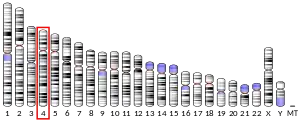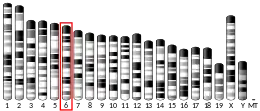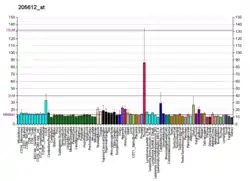Multimerin 1
Multimerin 1, also known as elastin microfibril interfacer 4 (EMILIN-4), is a protein that, in humans, is encoded by the MMRN1 gene.[5][6][7]
| MMRN1 | |||||||||||||||||||||||||||||||||||||||||||||||||||
|---|---|---|---|---|---|---|---|---|---|---|---|---|---|---|---|---|---|---|---|---|---|---|---|---|---|---|---|---|---|---|---|---|---|---|---|---|---|---|---|---|---|---|---|---|---|---|---|---|---|---|---|
| Identifiers | |||||||||||||||||||||||||||||||||||||||||||||||||||
| Aliases | MMRN1, ECM, EMILIN4, GPIa*, MMRN, multimerin 1 | ||||||||||||||||||||||||||||||||||||||||||||||||||
| External IDs | OMIM: 601456 MGI: 1918195 HomoloGene: 49134 GeneCards: MMRN1 | ||||||||||||||||||||||||||||||||||||||||||||||||||
| |||||||||||||||||||||||||||||||||||||||||||||||||||
| |||||||||||||||||||||||||||||||||||||||||||||||||||
| |||||||||||||||||||||||||||||||||||||||||||||||||||
| |||||||||||||||||||||||||||||||||||||||||||||||||||
| |||||||||||||||||||||||||||||||||||||||||||||||||||
| Wikidata | |||||||||||||||||||||||||||||||||||||||||||||||||||
| |||||||||||||||||||||||||||||||||||||||||||||||||||
Multimerin is a massive, soluble protein found in platelets and in the endothelium of blood vessels. It is composed of subunits linked by interchain disulfide bonds to form large, variably sized homomultimers. Multimerin is a factor V/Va-binding protein and may function as a carrier protein for platelet factor V. It may also have functions as an extracellular matrix or adhesive protein. Recently, patients with an unusual autosomal-dominant bleeding disorder (factor V Quebec/Quebec Platelet Disorder) were found to have a deficiency of platelet multimerin.[7]
References
- GRCh38: Ensembl release 89: ENSG00000138722 - Ensembl, May 2017
- GRCm38: Ensembl release 89: ENSMUSG00000054641 - Ensembl, May 2017
- "Human PubMed Reference:". National Center for Biotechnology Information, U.S. National Library of Medicine.
- "Mouse PubMed Reference:". National Center for Biotechnology Information, U.S. National Library of Medicine.
- Hayward CP, Hassell JA, Denomme GA, Rachubinski RA, Brown C, Kelton JG (Sep 1995). "The cDNA sequence of human endothelial cell multimerin. A unique protein with RGDS, coiled-coil, and epidermal growth factor-like domains and a carboxyl terminus similar to the globular domain of complement C1q and collagens type VIII and X". J Biol Chem. 270 (31): 18246–51. doi:10.1074/jbc.270.31.18246. PMID 7629143.
- Torres MD, Van Tuinen P, Kroner PA (Jun 2000). "The human multimerin gene MMRN maps to chromosome 4q22". Cytogenet Cell Genet. 88 (3–4): 275–7. doi:10.1159/000015537. PMID 10828608. S2CID 39874017.
- "Entrez Gene: MMRN1 multimerin 1".
Further reading
- Hayward CP (1997). "Multimerin: a bench-to-bedside chronology of a unique platelet and endothelial cell protein--from discovery to function to abnormalities in disease". Clinical and Investigative Medicine. 20 (3): 176–87. PMID 9189649.
- Hayward CP, Kelton JG (1998). "Multimerin". Curr. Opin. Hematol. 2 (5): 339–44. doi:10.1097/00062752-199502050-00003. PMID 9372017. S2CID 220574123.
- Hayward CP, Bainton DF, Smith JW, et al. (1993). "Multimerin is found in the alpha-granules of resting platelets and is synthesized by a megakaryocytic cell line". J. Clin. Invest. 91 (6): 2630–9. doi:10.1172/JCI116502. PMC 443327. PMID 8514871.
- Hayward CP, Rivard GE, Kane WH, et al. (1996). "An autosomal dominant, qualitative platelet disorder associated with multimerin deficiency, abnormalities in platelet factor V, thrombospondin, von Willebrand factor, and fibrinogen and an epinephrine aggregation defect". Blood. 87 (12): 4967–78. doi:10.1182/blood.V87.12.4967.bloodjournal87124967. PMID 8652809.
- Hayward CP, Cramer EM, Song Z, et al. (1998). "Studies of multimerin in human endothelial cells". Blood. 91 (4): 1304–17. doi:10.1182/blood.V91.4.1304. PMID 9454761.
- Maurer-Spurej E, Kahr WH, Carter CJ, Pittendreigh C, Cameron M, Cyr TD (2008). "The value of proteomics for the diagnosis of a platelet-related bleeding disorder". Platelets. 19 (5): 342–51. doi:10.1080/09537100802010547. PMID 18791940. S2CID 31920329.
- Polgár J, Magnenat E, Wells TN, Clemetson KJ (1999). "Platelet glycoprotein Ia* is the processed form of multimerin--isolation and determination of N-terminal sequences of stored and released forms". Thromb. Haemost. 80 (4): 645–8. PMID 9798985.
- Strausberg RL, Feingold EA, Grouse LH, et al. (2003). "Generation and initial analysis of more than 15,000 full-length human and mouse cDNA sequences". Proc. Natl. Acad. Sci. U.S.A. 99 (26): 16899–903. Bibcode:2002PNAS...9916899M. doi:10.1073/pnas.242603899. PMC 139241. PMID 12477932.
- Gevaert K, Goethals M, Martens L, et al. (2004). "Exploring proteomes and analyzing protein processing by mass spectrometric identification of sorted N-terminal peptides". Nat. Biotechnol. 21 (5): 566–9. doi:10.1038/nbt810. PMID 12665801. S2CID 23783563.
- Jeimy SB, Woram RA, Fuller N, et al. (2005). "Identification of the MMRN1 binding region within the C2 domain of human factor V". J. Biol. Chem. 279 (49): 51466–71. doi:10.1074/jbc.M409866200. PMID 15452129.
- Gerhard DS, Wagner L, Feingold EA, et al. (2004). "The Status, Quality, and Expansion of the NIH Full-Length cDNA Project: The Mammalian Gene Collection (MGC)". Genome Res. 14 (10B): 2121–7. doi:10.1101/gr.2596504. PMC 528928. PMID 15489334.
- Hayward CP, Fuller N, Zheng S, et al. (2005). "Human platelets contain forms of factor V in disulfide-linkage with multimerin". Thromb. Haemost. 92 (6): 1349–57. doi:10.1160/TH03-02-0123. PMID 15583744.
- Lewandrowski U, Moebius J, Walter U, Sickmann A (2006). "Elucidation of N-glycosylation sites on human platelet proteins: a glycoproteomic approach". Mol. Cell. Proteomics. 5 (2): 226–33. doi:10.1074/mcp.M500324-MCP200. PMID 16263699.
- Liu T, Qian WJ, Gritsenko MA, et al. (2006). "Human Plasma N-Glycoproteome Analysis by Immunoaffinity Subtraction, Hydrazide Chemistry, and Mass Spectrometry". J. Proteome Res. 4 (6): 2070–80. doi:10.1021/pr0502065. PMC 1850943. PMID 16335952.
- Adam F, Zheng S, Joshi N, et al. (2006). "Analyses of cellular multimerin 1 receptors: in vitro evidence of binding mediated by alphaIIbbeta3 and alphavbeta3". Thromb. Haemost. 94 (5): 1004–11. doi:10.1160/TH05-02-0140. PMID 16363244.
This article is issued from Wikipedia. The text is licensed under Creative Commons - Attribution - Sharealike. Additional terms may apply for the media files.




